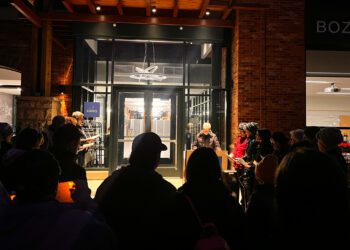STRs shave local housing options, Housing Trust to provide incentives to homeowners renting to long-term tenants
This is the first installment in a two-part series. Read the second installment here.
Editor’s note: This story has been edited to more accurately reflect the Bark family’s story.
By Bella Butler EBS STAFF
BIG SKY – In April, Colin McNamara drove from Big Sky to the Motor Vehicle Department in Bozeman to get a Montana driver’s license. After moving to Big Sky from Maine in fall of 2018, it was time to make it official.
McNamara debated if he should put his current address on the new ID. We’ve been living there for almost a year, he thought, and we’re about to renew the lease. Why not?
As he was leaving the building, he got a text from his landlords who had been renting a Hill condo in the Mountain Village to him, his girlfriend, Jackie Gonzalez, and their roommate a since June 2020.
The landlords would not be renewing the lease, they wrote, since they wanted to catch up on money lost renting long-term.
With a 60-day notice, McNamara began his search for new housing in Big Sky. Finding little luck during those two months, McNamara thought he’d have to abandon his career he began building as a bar manager at Lone Mountain Ranch and move back east. But days before moving out, he had stacks of packed boxes and nowhere to put them, nowhere to go.

McNamara’s story is not unique. When he told people he got “the AirBnB notice,” they all knew exactly what he meant.
Given the opportunity to make significantly more money on the short-term market, many homeowners are flipping long-term housing leases into vacation rentals. “You just hear the story so much,” McNamara said.
The Big Sky Housing Trust, which started as a Human Resource Development Council project but became an independent nonprofit this July, estimates that the current vacancy rate for long-term rental units in Big Sky and Bozeman is exactly zero. It’s not only that Big Sky doesn’t have enough units, argues Housing Trust executive director Laura Seyfang, it’s also that so many units are ending up in the hands of vacationers.
“I think the loss of long-term rentals here that went to the short-term rental market. I want to say it’s 30 percent of the [housing] problem,” Seyfang said.
At a March 10 board meeting, the Big Sky Resort Area District discussed the number of units needed to house Big Sky by 2023. Based on a 2018 study commissioned by the Housing Trust paired with a handful of growth projections, the analysis shared at the meeting found a deficiency of more than 1,400 units after considering newly developed Lone Mountain Land Company Housing and Big Sky Housing Trust housing like the deed restricted MeadowView development.
The analysis took into consideration what it labeled “pipeline” projects, or anticipated housing, including the Housing Trust’s forthcoming RiverView Apartments, leaving an estimated remaining need of 414 units by 2023. The Housing Trust estimates there are currently 1,200 units being rented on the short-term rental market.

This presentation at the resort tax board meeting before the pandemic hit Big Sky, sending droves of new residents to the area and spiking the real estate market, all conditions that have exacerbated the housing crisis.
Seyfang said the Trust would like to build more units designed for workforce, but that those projects are more than two years out. The nearest solution, a stopgap, she said, is making some short-term rentals available to long-term tenants.
A year and a half ago, the Housing Trust launched a rent local initiative aimed at inspiring homeowners in the area to rent to locals long term rather than putting their homes on the short-term rental market. Seyfang tried helping landlords find and vet tenants, and at the time explained the impact the shift could have on the community.
Though the Housing Trust was able to flip 14 homes to long-term rentals by providing convenience support and altruistic pep talks, according to Seyfang it’s not enough.
“We started with the convenience angle and now realize we need to put a little cash behind it to try to really convince more folks to try to help with the problem here and rent to locals,” Seyfang said. “We’ve realized that people can make a lot of money on the short-term rental market right now. It’s really escalated as people want to come and visit our incredibly beautiful community.”
According to Housing Trust research based on 2020 figures, homeowners in the Trust’s target homeowners associations for the rent local program—places like Hidden Village off MT Highway 64 en route to Big Sky Resort—make between as much as $10,400 in net profit more on the short-term rental market than on the long-term market if their unit occupied by vacation renters 45-55 percent of the year.
“We don’t want to take money out of people’s pockets,” Seyfang said, “so we’re trying to figure out how to incentivize people with some amount of money that might make it a more equitable choice for them.”
This year, the Housing Trust applied for various funds to add economic incentives to their rent local push. They applied for money from the resort tax district and the Spanish Peaks and Moonlight community foundations.
The Trust applied for $130,000 in resort tax and received only half of that for the project. Then-Vice Chair Sarah Blechta, who motioned for the cut, said that the project was too new and unproven to fund in the full amount.
The Moonlight Community Foundation chose not to fund the project, and the Spanish Peaks Community Foundation put up $15,000.
On Aug. 1, the Housing Trust will launch its pilot Rent Local Incentive Program.
Seyfang had initially set a goal to flip a total of 50 homes by the end of the year, but with less funding than she had anticipated, now thinks a total of 28—including the 14 already flipped—is a more reasonable target. The Housing Trust aims to add 100 new units to the long-term rental market through the program by 2023.
Seyfang acknowledges that the swap isn’t in the cards for all homeowners, and that the Housing Trust can’t afford to pay the deficit for homeowners with higher-end homes. She said they’re currently working on ways that these homeowners can contribute to housing solutions.
“We’ve taken away every roadblock we can think of. And so now we just have to figure out if this incentive will draw more [unit conversions],” Seyfang said.

Sixty-one days after McNamara got his 60-day notice, he found Katie and Gerry Bark, a couple from Bozeman who bought two Hill Condos two years ago as an investment. The Barks initially rented their units on the short-term market but felt that long-term rentals would be safer and more reliable when the pandemic hit.
The Barks say that as long as their expenses are covered and everyone’s happy, they’re pleased with the long-term rental set-up.
“Because we know it’s such a housing crisis we sort of feel good about providing a nice place for somebody to live,” Katie said. Having kids living in the area, the Barks are empathetic to other young people’s housing woes.
The Housing Trust helped connect McNamara, Gonzalez and their new roommates with the Barks’ home, where they now have a yearlong lease.
“It was the biggest relief,” McNamara said.
After a few days in the new home, McNamara repositioned a houseplant, one small act of building comfort in the place he knew he could stay, at least for a while.











